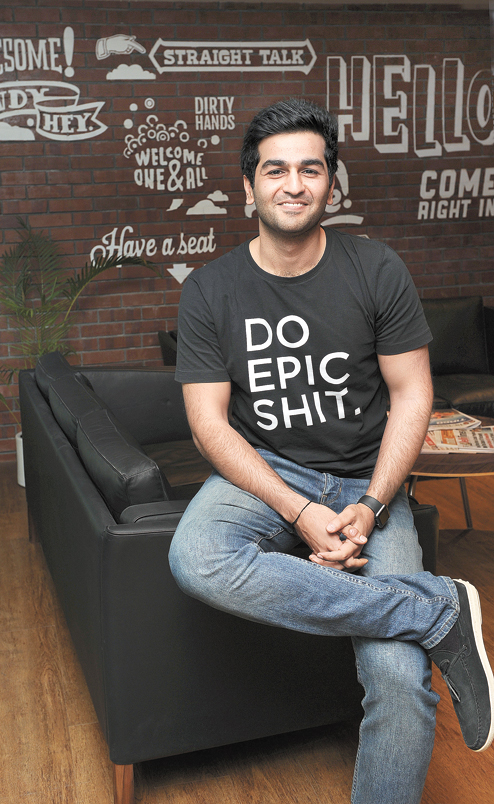
It’s a David and Goliath battle for hi-tech entrepreneur Kavin Mittal. Hike, his three-year-old messaging company, has over 100 million users who send each other more than 40 billion messages each month. But that’s still far behind his biggest and most muscular mega-rival, WhatsApp, the messaging service on almost every smart phone in the country and which globally has one billion customers.
But Mittal, 27, isn’t fazed by his giant competitor. He reckons Hike is a strong Number 2 in the Indian market and there’s room for two messaging services in this country. Says Mittal: “It’s possible for two people to win this market in two very different ways.”
Keep in mind also that while Hike’s pitted against WhatsApp, one of the fastest-growing Internet giants, and other powerful rivals like Facebook Messenger and Snapchat, it also has powerful backers. Kavin Mittal’s father is Sunil Bharti Mittal, the billionaire owner of Airtel (who, at last count, was reckoned to be worth $6 billion). Also, throwing its weight behind Hike is Japanese technology giant Softbank.

Kavin Mittal, though, is keen to make it on his own steam — without leaning for help on family and friends. He’s a young man in a hurry who built his first app when he was just 19 and was slightly bored by classes at London’s prestigious Imperial College where he was studying engineering.
“I realised my interests were not in deep engineering and so in third year, a friend and I started thinking about ideas and things we could build,” he says.
Today, that determination to create his own hi-tech products and build his own company has led to Hike, which has over 240 people at its very distinctive and futuristic office in New Delhi’s upcoming Aerocity complex.
This is a distinctly post-industrial-age office, with rocking chairs, pouffes and beanbags and even one small cubicle where young employees sprawl on mattresses on the ground working on their Apple computers. Several areas are covered with artificial turf to give the office a relaxed, recreational feel. One reception wall is covered with “handprints” of the entire staff.
Says Mittal: “We spend most of our time in the office. And so our idea was: ‘Could we make it into an office that was not only work, work, work, but also like a university campus?’”

Messaging is one of the most competitive arenas in the Internet space and it’s also the one that attracts the highest valuations from cash-rich venture capitalists and stock markets. Just about every smartphone has one messaging app or another and Whats-App, Snapchat, Instagram and Facebook Messenger are all battling furiously for customers. In China, the star of the scene is WeChat, which has 650 million customers and which provides a wider range of services than Whats-App currently does.
Similarly, in Japan, the messaging app, Line, has 200 million users and also offers a range of other services including mobile payments.
Mittal’s vision of Hike is as a messaging plus services app, much like WeChat and Line and one of its latest offerings has been a news-in-small-capsules app. Says Mittal: “We’ve got people browsing 1.2 billion stories a month on the platform, which may make us the biggest local news app in the country.”
Apart from news, Hike offers a cricketing app that gives instant information as well as hundreds of stickers that can be sent via the service. “We have so many micro-services or micro-apps as we call them. I have cricket, I have news, I have coupons and I have Natasha who’s our virtual assistant,” says Mittal. Right now, Hike offers two languages, English and Hindi, and it plans to add eight more in the near future. He also launched Hike Direct, which allows users to share data within 100m even without Internet connectivity.
.jpg)
.jpg)
The aim eventually is to make Hike Messenger a platform supporting a huge number of “mini-apps” so that users won’t have to clog up valuable space on their phones with scores of apps. “Messaging is the most-used app on the phone. We believe messa-ging will make apps obsolete in four or five years.”
Mittal’s initial love was app designing but he’s come a long way since he took his first steps into the world of app development in his late teens. He and another app designer friend slaved over their computers in their bedrooms for months and created what he says was a “beautiful movie-ticketing app which enabled users to browse through trailers and book tickets and pay for them”.
The app got half-a-million users, a large number for then because smartphones had just started being sold and there were only a few million iPhones at the time.
The snag was that while the app worked well, it wasn’t a great business because the movie theatres only offered them a tiny cut for each sale. Says Mittal: “If you’re building a ticketing app, the cut of that ticket is very small.”
He formed a company called App Spark and built two “great apps” and then began looking for bigger opportunities and travelling to size up transformations taking place globally. Says Mittal “I started spending two weeks in India, two weeks in London and a week in San Francisco every five weeks for six months. I just travelled and met a bunch of people” and realised that whatever he wanted to do, “I wanted to do it in India, which was home”.
During his travels he began to figure out the key challenges any Internet company faces in the Indian market. Indians are still relatively poorer in relation to the rest of the world and Internet connectivity is also poor.
.jpg)

In fact, to understand problems an average mobile phone user faces, Mittal always clutches two phones wherever he goes. One, as might be expected is an iPhone 6S, but he only uses it sparingly. The other is a low-end Moto E that retails in India for Rs 6,000 onwards. “This phone can handle no more than three apps because there’s a bunch of nonsense preloaded on it that I don’t want to use and which I can’t uninstall.”
He’s also deeply conscious that Indians have very low spending power and he quotes a study which estimates the Chinese need to work 3.5 hours to afford 1GB of data. Indians must work a hefty 12.5 hours to afford the same data amount. “So, even though (data) costs are low, relatively speaking data is expensive,” he says.
Can Hike become a cash-rich giant player in the Internet space? Certainly, it’s in a booming field and has powerful backers who’ve put money on it.
Initially, it received funding from Bharti Softbank, a joint venture of Bharti Enterprises and Japan’s Softbank. More recently, New York-based Tiger Global, one of the world’s most fast-moving investment firms, invested $65 million in Hike. Besides that, a clutch of Silicon Valley veterans including Aditya Agarwal of Dropbox and Adam D’Angelo, founder of Quora, have made personal investments in the company. Says one analyst: “When you think of a start-up you immediately think about its longevity. Hike has the implicit blessing of Airtel, so it immediately has a longer runway.”
But nobody knows when the next disruptive technology is coming along in the Internet space. To give one small example, only a few weeks ago Snapchat launched its easy-to-use video calling facility.
.jpg)

And while Hike has always had strong backers, it has certainly had its “close calls”. The company was launched in December 2012 and had a target of getting three million users by March the following year.
But, on January 31 that year they didn’t have a single user in India though they’d picked up, for some reason, in Germany and the Gulf. “We literally had our backs up against the wall. We had two months to go from zero to three million,” says Mittal.
In desperation, they came up with a novel referral scheme called Talktime Rewards by which if a user referred a friend, he or she would get free talk-time or data and the idea took off. “Our scheme took us from zero to five million in two months.” Later on, they faced another problem when they couldn’t keep up with the flood of new customers!
Still, Mittal reckons his company can keep pace with the changes. “We know exactly what people want in this country and, as the market evolves very fast, we can keep track.”
To cope with all these hi-tech tensions, though, Mittal has taken to meditation. He heads — often more than once a day — to Hike’s meditation room when he needs a breather. “I meditate in the morning and night as well and some days in the afternoon. I started meditating two or three years ago and it has changed my life. I have become 10 times more productive because I gym and meditate.”
And he’s got one big regret — that there aren’t more than 24 hours in a day!










